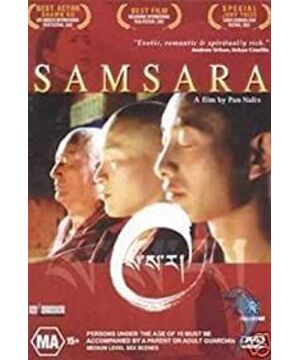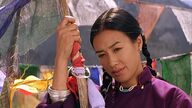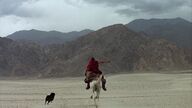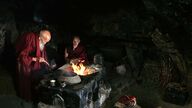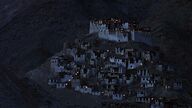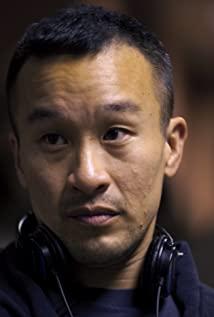The story called him to say, go home
, the road down the mountain is so long.
The vast mountains are full of rubble. It was noon, and the sun was a little
quiet on the mountain road. Under such a poisonous sun, no one wants to come out.
Even the mountain antelope has no spirit, standing lazily. Thoughtfully passed this lazy afternoon.
Step by step.
Everything was broken, and there was the sound of small stones falling.
It was two people who came one after the other.
The old monk walked in front, and behind him was a young monk who was a young man.
The old monk's red monk robe has gone through the years, and has brought a little dark color, sauce red. Although the old monks often wash their clothes very seriously every month and let them dry in the sun on a stone, the clothes are still old after all. It's like people are getting old.
Young monks have dark skin and a healthy wheat color. He is tall, with thick eyebrows and big eyes, and is the most typical Kangba man.
The old man walked forward cautiously and cautiously.
The young monk followed, staring at his master's steps, ready to put his hand on it. It was nothing but a habit he had developed over the years.
He has lived in a temple on the mountain since he was a child. Since his family sent him to him when he was a child, he has grown up by his master's side.
And this way, he was taciturn, and this time down the mountain, it was different from the past. Not going to town to buy rice and salt.
He is leaving.
He is leaving. He is going home.
When I was talking to Master, Master was cleaning the cabinet where the scriptures were kept.
He saw that the master's hand stopped for a moment. Then, time seemed to be frozen.
He lowered his head, only to feel the time is running out. He didn't want to contradict Master, but he had made the decision. he thought to himself.
No matter what Master says, I will not change my mind.
he thought.
The master continued to clean the cabinet, then turned around, his movements a little slow and a little trembling.
Master is old. He thought, when he thought about it, his heart was a little uncomfortable.
But Master just put the rag in the water basin and floated it, twisting it. And said, oh yeah, are you going home?
He did not expect such a reaction from Master, as if he had said something very common.
He still remembers that when he was a child, he was tricked and his master punished him for copying scriptures, and then secretly gave him candy in the afternoon.
He knew how much the master loved him, but he didn't expect that the master didn't even keep him.
He nodded and said yes.
While getting up and pouring water, the master said, "Aren't you coming back?"
He was a little embarrassed, shook his head sadly, and said, not coming back.
The master held the basin, nodded, and put the basin on the table. He saw that the water droplets on the basin were on the table, leaving a semi-circular watermark.
The master said, "Okay, I'll take you down the mountain that afternoon."
Finally got to the bottom of the mountain.
Master is still the same as usual, not angry. It's as if he didn't leave the temple or Buddhism this time, but it was natural for him to go down the mountain to buy salt and tsampa.
The master said, oh, then I will send you here.
He was a little sad and couldn't say why. He just nodded and said, well. But he didn't want to turn around.
Although the master did not keep him, he knew that every step of the master was to keep him.
Thinking of this, he felt even more uncomfortable, so he knelt down and kowtowed three times to the master. Did it for three weeks.
He was not grateful, he just wanted to use these three weeks to repay a little Master's kindness.
The master did not hold him back, nor did he help him up. The master just stood as usual. The master is not tall, and he trembles slightly when he is old. The master nodded slightly, looked at him, and said with a shallow sigh.
"Go home."
He stood blankly. Looking at the master step by step, trembling, trembling slightly, he walked back to the mountain road. That little red, little by little. In the end, it finally disappeared from his vision.
He knew that the master had returned home.
And he is going home.
After many years, he returned to the mountain.
The mountains are still the same. It's just the mountain antelope, which is already the grandson or great-grandson of the previous one. They had not seen him, and were looking at him curiously.
He looked at the mountain. He knew that the temple was still there.
Perhaps none of the lamas who knew him in the temple were gone.
And what he really knew was that the old man in red was no longer there.
The master who told him at the intersection of Noon Mountain, let's go home, is no longer there.
Even if he kowtowed 10,000 heads and did 10,000 prostrations, that trembling, majestic and kind old man would no longer stand in front of him.
But he still fell to his knees with a bang, and the pain in his heart was as piercing as his crying.
If someone passed by at this time, they must not know what this crazy-looking man was crying.
In fact, what he said was very simple. He just said, Master, I'm going home. Master, I really went home...
He finally understood how much tolerance and hope the Master said back then to simply go home.
The master wanted to tell him, tell him who lost his way, just like when he was a child playing in the wild in the mountains, and he was tired. At this time, he should go home.
Tears clouded his vision.
He seems to have seen him return to the temple from the mountains when he was eight years old. The gate that was hidden for him.
He stood at the door frightened. Master was sitting in the room, holding a lamp and reciting sutras. Seeing him come back, the master nodded and asked him back?
He put his hands behind him, his heart was beating loudly, and he said, well, I'm back.
The master nodded again and said that
he would not dare to speak after copying the scriptures 100 times tomorrow,
so the master said, come over for dinner today.
Only then did he see that there was a bowl of dinner left for him beside Master's bean-yellow oil lamp...
Master, I want to go home. are you still there?
----------------------------The dividing line of film reviews------- ----------
Zhong Liti is outrageously beautiful in the play.
She is more like a bodhisattva than a witch.
Maybe everyone will feel differently when they watch this play.
Apu is a very virtuous lama, so he makes a promise at the end of the film that he will come back according to his wish.
And the rainbow that the male protagonist sees is a sign of Apu's passing away. (Rainbow of Mahasiddhas)
Zhong Liti disappeared into the air at the end of the film.
The male protagonist knelt down and cried bitterly.
I also burst into tears.
In my opinion, Pama, the girl, is more like a compassionate manifestation of the guru.
Don't be overly protective, she said. Let the children know for themselves that it is cold outside.
She said how could a mother leave her son behind in the middle of the night.
The male protagonist is an unenlightened monk.
When he was in the temple, he longed for the world. He thought that happiness was in the mundane world.
When he was at home, he longed for the monastery again. He thought the peace was in the temple.
When he was a monk, he failed his master.
When he was a layman, he failed Pama.
He thought that enlightenment was somewhere far away.
He slumped to the ground and cried.
His marriage with Pama, his relationship with his guru,
seems to have come to an end at this moment.
It's like our life will eventually come to an end.
Life and death are endless, only the will is infinite
View more about Samsara reviews


